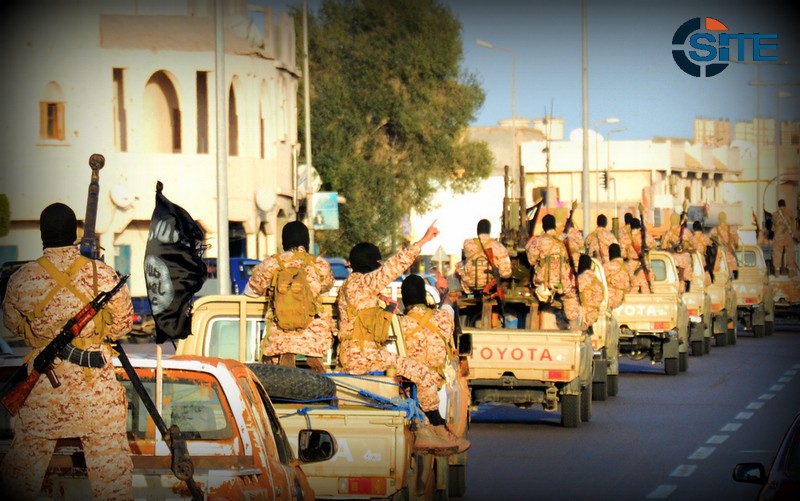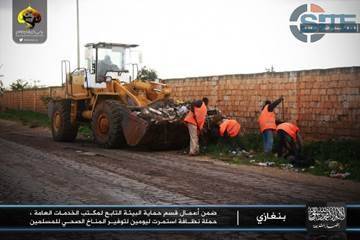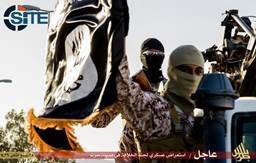Libya Failing

The murder of twenty-one Christians in Libya by an affiliate of the Islamic State (IS) has brought the sad decline of that country back to international attention. A few months ago, I noted that the ongoing collapse of Libya was not random chaos, nor was it just the result of “militancy” or a lack of governance; rather there was purposeful action by al-Qaeda (AQ)-linked groups pushing the country in a direction that favors violent extremism.
There are, of course, other underlying causes for the problems of Libya, but the deliberate intent and growing capabilities of these organizations, and the resulting effects on the situation across North Africa, should not be underestimated.
Since September, the situation in Libya has deteriorated further. Faced with the seizure of Tripoli by AQ-linked militants, the Libyan parliament—with family members—fled the capital and was forced to take refuge in a Greek car ferry. Nearly half of the legislators have abandoned their positions, leaving the parliament perilously close to lacking the necessary attendance for a quorum. To combat the militants, Egypt, in cooperation with Libyans, has been bombing positions in eastern Libya off and on since October. Egypt has also been supporting General Khalifa Haftar, who has been waging a one-man war against the extremists, apparently without the support of the official government of Libya.
If the Egyptians continue their airstrikes, they might find themselves in combat against an Islamist air force. A powerful Islamist coalition called “Libya Dawn,” which has set up its own competing parliament, has reportedly repaired some of the aircraft left over from the Qaddafi era and used them against rivals in the town of Zintan.
 This latter point demonstrates the growing power of various militant factions, many of which linked to AQ in some way. Since July, a coalition of jihadist groups known as the Revolutionary Shura Council, which includes Ansar al-Shariah, has controlled Benghazi, a move that is being contested by Haftar. This led to a steep escalation in violence and, the deaths of thousands and the displacement of hundreds of thousands of Libyans over the past eight months. In December, another alliance of jihadists was created in Derna. The “Mujahidin Shura Council,” a name generally associated with AQ-linked groups, has denied any connection with the Islamic State (IS), but has threatened a harsh response to Egyptian airstrikes. Meanwhile, tribal militias from Zintan, allied with Haftar, were defeated by Libya Dawn and forced from Tripoli. The militias have since been engaged in fierce fighting with the Islamist coalition, at times through allies and partners among other people groups (like the Tuareg). One of the results of this fighting has been an 80 percent cut in Libyan oil production.
This latter point demonstrates the growing power of various militant factions, many of which linked to AQ in some way. Since July, a coalition of jihadist groups known as the Revolutionary Shura Council, which includes Ansar al-Shariah, has controlled Benghazi, a move that is being contested by Haftar. This led to a steep escalation in violence and, the deaths of thousands and the displacement of hundreds of thousands of Libyans over the past eight months. In December, another alliance of jihadists was created in Derna. The “Mujahidin Shura Council,” a name generally associated with AQ-linked groups, has denied any connection with the Islamic State (IS), but has threatened a harsh response to Egyptian airstrikes. Meanwhile, tribal militias from Zintan, allied with Haftar, were defeated by Libya Dawn and forced from Tripoli. The militias have since been engaged in fierce fighting with the Islamist coalition, at times through allies and partners among other people groups (like the Tuareg). One of the results of this fighting has been an 80 percent cut in Libyan oil production.
While the situation in Tripoli has somewhat stabilized with the victory of Libya Dawn, there has recently been a spike in terrorist attacks associated with IS. The first indication of IS in Libya was the return of Katibat al-Battar, an IS fighting group, from Syria to their homeland. Then, a Derna group called the Majlis Shura Shabaab al-Islam swore fealty to the head of IS. In October, “provinces” of IS were announced in Barqa (Cyrenica – eastern Libya), Tripoli, and Fazzan (southern Libya). Over the next few months, these “provinces” would claim a series of spectacular attacks in Tripoli, including bombings at the Egyptian and UAE embassies; car bombing the diplomatic security building; murdering two journalists; bombing the Algerian embassy; attacking the Corinthia Hotel in the capital with suicide bombers; and, just a few days ago, bombing the Iranian embassy. The groups have also posted photographs and lengthy descriptions of the numerous car bombings, beheadings, hit-and-run attacks, assassinations, and other assaults that they have carried out around the country.
 There are growing indications that IS hopes to become a major player in Libya and wants to control territory in that country just as it does in Syria and Iraq. First, the organization has established its own training centers in the east of the country to add to those in southern Libya, where hundreds of fighters are prepared for combat in Mali, Iraq, or Syria. By creating its own training capability, IS is signaling that it intends to build its fighting power for the long haul. Second, IS “provinces” have attempted to take over at least two cities in the past few weeks. In early February, one of the groups made a huge show of force in Nawfaliyya (not far from Sirte), and announced that they had seized control of the city. An IS group (perhaps the same one) then occupied the university, radio station, hospital, and government administration buildings in Sirte, claiming the city as their own. It is also likely that the aforementioned 21 Coptic Christians were murdered on the beach in Sirte.
There are growing indications that IS hopes to become a major player in Libya and wants to control territory in that country just as it does in Syria and Iraq. First, the organization has established its own training centers in the east of the country to add to those in southern Libya, where hundreds of fighters are prepared for combat in Mali, Iraq, or Syria. By creating its own training capability, IS is signaling that it intends to build its fighting power for the long haul. Second, IS “provinces” have attempted to take over at least two cities in the past few weeks. In early February, one of the groups made a huge show of force in Nawfaliyya (not far from Sirte), and announced that they had seized control of the city. An IS group (perhaps the same one) then occupied the university, radio station, hospital, and government administration buildings in Sirte, claiming the city as their own. It is also likely that the aforementioned 21 Coptic Christians were murdered on the beach in Sirte.
It seems clear then that more must be done to prevent Libya from falling and failing completely. Whether the will can be found to do so is another challenge entirely.
The Egyptians carried out a series of bombings in retaliation for the beheadings, although these are unlikely to destroy the IS affiliate or prevent it from carrying out further attacks in the country. Bombing is also unlikely to end the much greater power of groups like Libya Dawn, the Mujahidin Shura Council, or the Revolutionary Shura Council. All three have far greater claim to controlling territory than IS’s “provinces,” and one is in possession—however temporarily—of the nation’s capital. Despite his commitment to retaking the country from the Islamists and jihadists, Haftar has also—at least so far—been unable to do anything but survive their offensives. It seems clear then that more must be done to prevent Libya from falling and failing completely. Whether the will can be found to do so is another challenge entirely.
